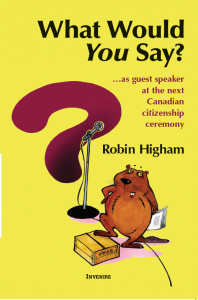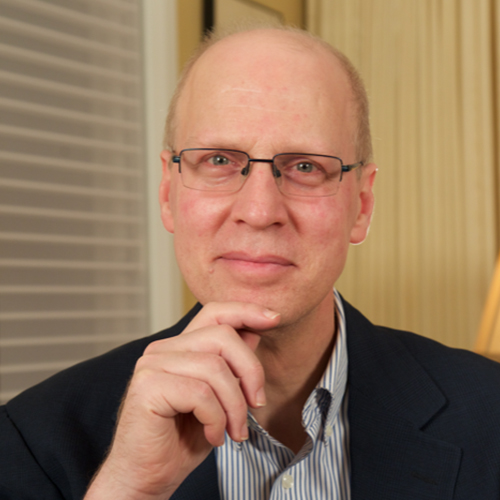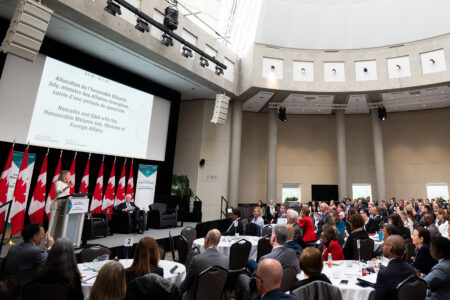
 Robin Higham, my helpful ‘trusted reader’ for my book, Policy Arrogance or Innocent Bias: Resetting Citizenship and Multiculturalism, has written What Would You Say? … as guest speaker at the next Canadian citizenship ceremony, an anecdote-based approach to understanding the rights and responsibilities of citizenship.
Robin Higham, my helpful ‘trusted reader’ for my book, Policy Arrogance or Innocent Bias: Resetting Citizenship and Multiculturalism, has written What Would You Say? … as guest speaker at the next Canadian citizenship ceremony, an anecdote-based approach to understanding the rights and responsibilities of citizenship.
His latest book develops further his thoughts on integration, first expressed in his earlier work, Who Do We Think We Are, which focussed on reasonable accommodation,.
As before, Higham uses archetype-characters both Canadian-born and immigrants to express a range of perspectives, ranging from ‘old-stock’ (indigenous, two francophones, anglophone) to ‘new-stock’ (East European, Latin American, Indo-, and Muslim) Canadians. Higham uses these characters to fashion a conversation regarding the responsibilities of integration and citizenship.
This is an effective technique to outline some of the issues involved and capture different perspectives.
However, like any anecdote-based approach, it has a number of weaknesses, starting from how one frames such discussion, and what assumptions and premises underlie his argumentation.
Higham’s underlying bias and ideology are clear. His choice of Gilles Paquet’s apocalyptic frame — political correctness, reluctance to confront, culture of entitlement, and unreasonable accommodation — and how these are interpreted, reflect a distinctly conservative perspective, focussed on social cohesion more than inclusion.
But this frame is more asserted than demonstrated through evidence, along with his underlying premise that integration is the responsibility of the newcomer. His characters all largely assert this, with the anecdotes selected to buttress his arguments, with limited examples of the more nuanced approach to integration.
In reality, there is a more complex dynamic of integration and accommodation, whereby wider society also plays a significant role in how it adjusts to the needs and requirements of newcomers, within the general framework of Canadian law.
A large part of the relative success of Canadian immigration, citizenship, and multiculturalism policies reflects this integration and accommodation dynamic. Canadian society adapts over time as its diversity changes. Integration is not one-way but multi-dimensional, as successive debates over what kinds of accommodation are reasonable and what are not illustrate.
There is an abundance of evidence, ranging from Statistics Canada, OECD and other international organizations, along with and public opinion research and election results, that indicates, overall, that Canada is remarkably successful compared to other countries in building an integrated society that recognizes the diversity of different groups, and one that most Canadians are comfortable with. A large part of this success reflects precisely our ability to be flexible and accommodate difference, allowing integration to take place over time, but within the overall Canadian constitutional and legal framework.
Anecdotal evidence suggests that ‘political correctness’ and a ‘reluctance to confront’ can be seen as civility and that the alternative, as seen in the recent Canadian election (e.g., the wedge politics of the niqab), the USA (e.g., the Republican primary) and Europe is neither helpful to integration and belonging. And while a preference for a more Cartesian approach to accommodation issues may be seductive given greater clarity, society evolves with time, and the more ad hoc approach of (English) Canada has arguably proven more effective.
This is not to say that Canada is without challenges, whether it be with respect to the persistence of poorer economic outcomes, finding the right balance between integration and accommodation, or the declining rate of citizenship.
But given this, where does Higham end up on citizenship rights and responsibilities for newcomers?
- Be mindful of what wasn’t working when you left home – emigrated – and also remember why you chose to come to Canada. Many newcomers probably arrive here with valuable citizenship lessons for us all.
- Exercise civility … even towards the ‘others’ in your community. You should also find that there are many fewer ‘others’ around you once you join the ‘otherness community.’
- Civics … we need your engagement and investment in our democratic processes and institutions. They are our default complaint-management mechanism.
- Strive for low maintenance citizen status, especially, but not only, with respect to government and community-funded, social-support programs.
- Build trust amongst citizens, all citizens. Always talk to strangers. Seek to minimize ‘transaction costs.’
- Be sensitive to the package of those obvious un-Canadian transgressions. Know what kinds of things it is best to avoid.
- At home, be alert to your responsibility to respect and protect each of your family members’ rights. You will have to both monitor and coach the youngsters in your entourage.
- Accept that there are limits to the capacity of your community to accommodate new expressions of values, beliefs and traditions. Expect to have to make adjustments of your own in order for you and your family to develop and to prosper.
To Higham’s credit, these are expressed with respect, modelling how one can overcome the ‘reluctance to confront’ in a manner that encourages dialogue rather than shutting it down.
But it does beg the question: how would one construct such a list that applies to all, both old and new Canadians? My take, drawing on Higham’s list, suggests that this is not difficult:
- Be mindful of what wasn’t working when you or your ancestors left the country of origin and chose to come to Canada.
- Exercise civility towards all, whether new or old Canadians, whether from one’s ethnic or religious group or not, whether male or female, whether gay, straight or transgendered, etc.
- Engage and participate actively in wider Canadian political life and debates, not just ones of immediate interest to you.
- Our social safety net is to be used when needed, not abused.
- Be trustful of others and forgiving of misunderstandings.
- Be understanding of others and their sensitivities, whether cultural, religious or other. Accommodate where feasible and treat accommodation requests with respect.
- Be mindful of one’s biases and prejudices before acting or opining.
- Apply these in the home, workplace and wider society.
Returning to a theme that I have explored in my own writings, the relative strengths and weaknesses of evidence and anecdote, I think it important to underline that while both have their place in terms of policy development, assertions and anecdotes are invariably more susceptible to bias and ideology.
Evidence may not be bias-free — how one chooses which evidence to cite and how one constructs an evidence-based narrative — but is more constrained than relying on pure anecdote. With Ottawa returning (thankfully) to more evidence-based policy making, public servants nevertheless must be mindful of the risks of such bias in their choice of evidence, particularly since it may be less challenged by the political level.
I encourage those interested in citizenship and multiculturalism issues to read Higham’s book for his modelling of respectful dialogue. But I would also encourage all to consider how to frame such discussions in a manner that includes old and new Canadians alike, and offer my list above to continue the conversation.
—
A slightly condensed version of this article appeared here: Integration Not Sole Responsibility of Newcomers – New Canadian Media








